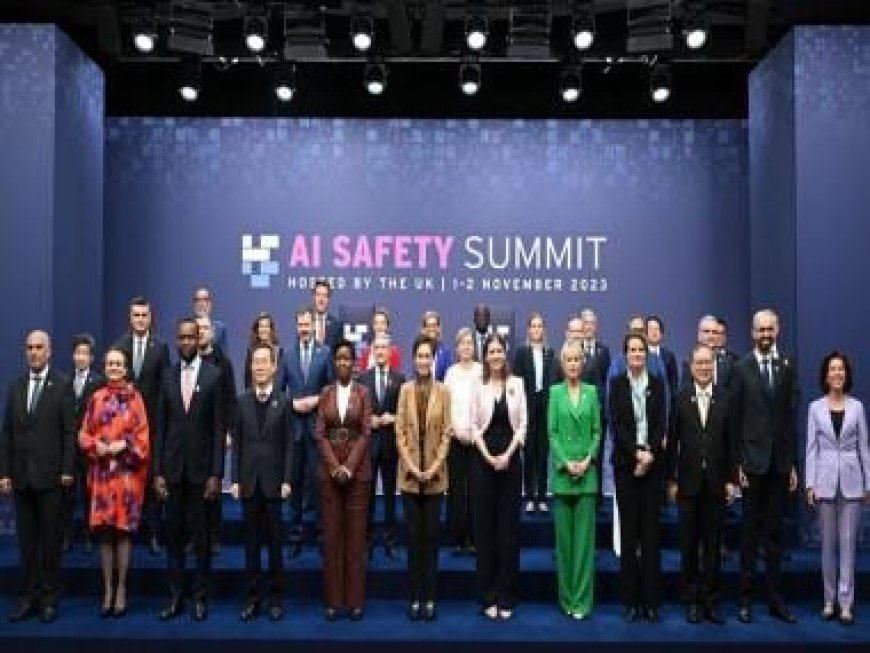Signing of Bletchley Declaration, King Charles’ speech: Here are key moments from UK AI Safety Summit
Signing of Bletchley Declaration, King Charles’ speech: Here are key moments from UK AI Safety Summit

In an unprecedented milestone in regulating AI, representatives and companies from 28 countries, including global tech powerhouses like the United States and China, along with the European Union (EU), signed a groundbreaking agreement aimed at addressing the challenges posed by cutting-edge AI models.
This is a significant development as it will set the tone for how AI is likely to be developed for the foreseeable future. However, it shouldn’t come as a surprise if some countries and companies that signed the declaration, do not abide by it.
Here are some of the key developments, from the first day of the summit.
The adoption of the Bletchley Declaration on AI safety
The summit, named the UK’s AI Safety Summit, brought together tech experts, world leaders, and representatives from 27 countries and the EU. This historic gathering is taking place at Bletchley Park, a renowned location that served as the home to codebreakers during the Second World War.
The Bletchley Declaration represents a “world-first” accord, designed to tackle the myriad of safety concerns associated with advanced AI models, particularly those developed by major entities like OpenAI, Google and Microsoft. While the declaration signifies an important step in addressing AI safety issues, the specific strategies and mechanisms for implementation remain somewhat ambiguous.
Global pledge for AI safety
The Bletchley Declaration aspires to identify and address “AI safety risks of shared concern” and build “respective risk-based policies across countries.” Although the finer details of how these agreements will be put into practice are yet to be determined, the UK’s Secretary of State for Science, Innovation, and Technology, Michelle Donelan, expressed her enthusiasm, hailing the agreement as a “landmark achievement” that lays the groundwork for future discussions.
The UK government has also announced its commitment to hosting future AI safety summits. South Korea is set to launch another “mini virtual” AI Summit within the next six months, and France will host the next in-person AI summit next year.
However, some experts have voiced concerns that the agreement may not go far enough in addressing AI’s ethical and practical challenges. Paul Teather, CEO of AI-enabled research firm AMPLYFI, emphasized that while bringing major powers together to endorse ethical principles is significant, it’s crucial to swiftly develop concrete policies and accountability mechanisms. Vague terminology and reliance on voluntary cooperation, Teather argues, might fall short in establishing globally recognized best practices for AI.
From King Charles to Elon Musk, prominent figures at the summit
The UK’s AI Safety Summit witnessed the participation of influential figures in the tech and political arenas. Billionaire tech entrepreneur Elon Musk made an appearance and emphasized the need for establishing a framework for oversight, describing it as a means to appoint an “independent referee” to monitor the activities of leading AI companies. Musk will also engage in discussions with British Prime Minister Rishi Sunak through his platform X.
Britain’s King Charles III delivered a video address during the summit, likening the significance of AI development to historic milestones like the splitting of the atom and harnessing fire. He underscored the potential of AI in advancing clean, green energy but cautioned that collaboration was essential to mitigate its substantial risks.
US Vice President Kamala Harris called for immediate action to address a broad spectrum of AI risks, extending beyond existential threats like cyberattacks or bioweapons. She stressed that there are additional threats causing real harm that also require attention and action.
Different governments, different gendas.
British Prime Minister Rishi Sunak aims to position the UK as a global leader in AI. However, it faces stiff competition from other countries. The United States, under President Joe Biden, has already taken steps to lead regulation of AI, signing an AI executive order a couple of days ago. The European Union has also established its own set of AI guidelines.
Notably, the UK’s approach differs from the EU, as it does not intend to introduce new legislation to regulate AI. Instead, it will require existing UK regulators to take responsibility for AI within their respective sectors.
China, on the other hand, has been actively implementing its own rules governing generative AI.
Wu Zhaohui, China’s vice minister of technology, announced at the summit that China is committed to contributing to an “international mechanism” for AI. This initiative aims to broaden participation and establish a governance framework based on a wide consensus, ultimately delivering benefits to people worldwide and building a community with a shared future for mankind.
What's Your Reaction?



























































